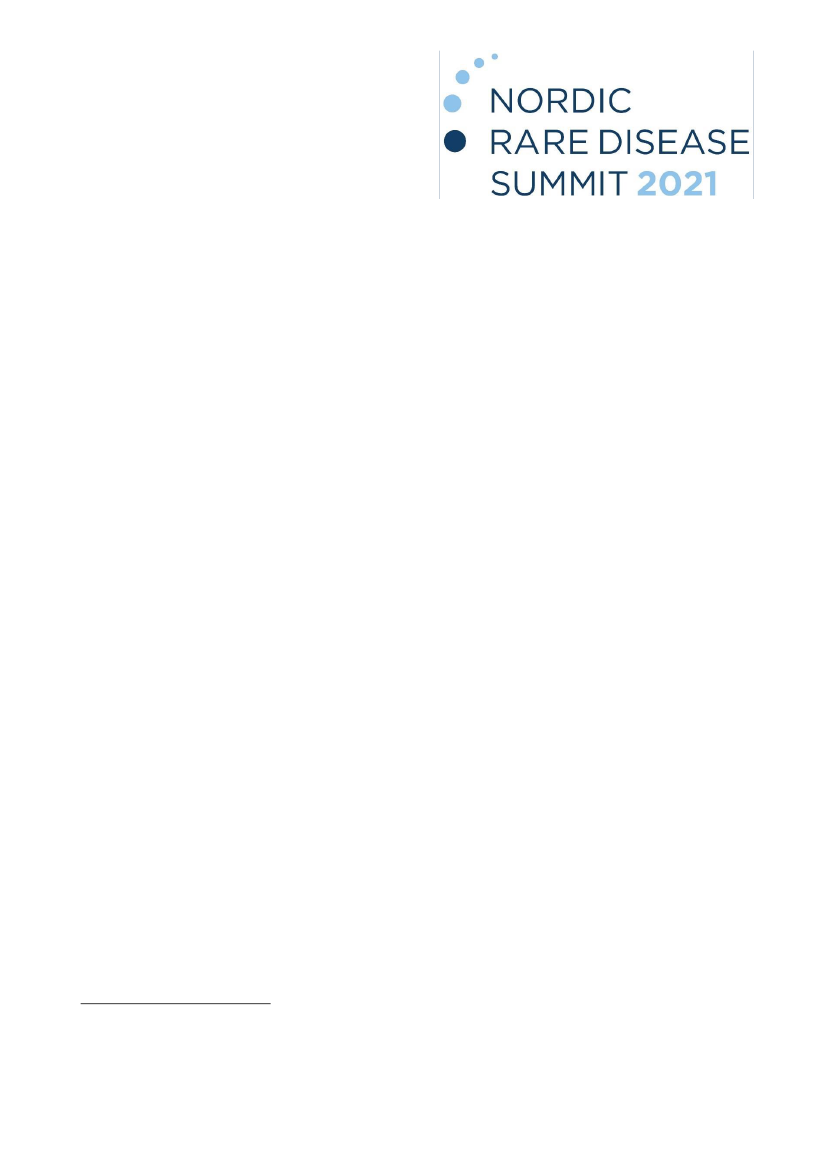
ROADMAP FOR
RARE DISEASES
The Nordic Rare Disease Summit, organized as a virtual meeting on 12
th
and 13
th
of April 2021, gathered a wide range of rare
disease experts, decision-
and policymakers as well as representatives from NGO’s, patient organizations, academia and
industry from across the Nordic countries. All coming together to debate how to best overcome the special challenges
characterizing the rare disease area.
This Nordic Roadmap for Rare Diseases sums up key messages, discussions and new knowledge from the summit
–
with an
aspiration to provide policy guidance relevant for the Nordic countries, recommendations for future co-operation and a
shared call for action.
WHAT WE ARE FACING:
The special
challenges of rare diseases are…
The summit discussions revolved around three overarching
themes “Diagnostic Delay”, “Patient Empowerment” and
“Patients’ Access to Innovation”. Despite progress in these
areas, a stronger focus and an increased collaboration
amongst all stakeholders is needed to enable better lives for
people living with a rare disease. This need is reinforced by
the COVID-19 pandemic which has negatively impacted
quality of life and challenged access to necessary care.
Diagnostic Delay
The journey to diagnosis for people with rare diseases can
often be long and uncertain. On average it takes six to eight
years before a person with a rare disease receives the correct
diagnosis and more than 40% of rare disease patients are
misdiagnosed at initial presentation.
1,2,3
Due to the rarity of the diseases there is limited awareness
and knowledge of the signs and the symptoms of rare
diseases. Most physicians will only see a small number of
people with a rare disease, which makes it difficult to build up
the necessary clinical knowledge and experience to recognize
the symptoms.
In addition, the cooperation and pooling of knowledge across
expertise areas and across countries is unsystematic and
therefore the potential for knowledge exchange between
healthcare specialists remains untapped.
The issue of diagnostic delay and the need for better tools,
knowledge and cooperation to secure earlier diagnosis of
people with rare diseases was elaborated throughout the
summit.
Need for patient empowerment
Due to low prevalence, lack of expertise and poor quality of
life amongst many people living with a rare disease,
empowerment plays a crucial role.
Patients and their relatives hold unique knowledge of living
with a rare disease and should be involved and consulted on
all levels.
4
. There is a need for empowerment on individual
patient level in the form of personal skills and knowledge, on
community level in the form of mutual support groups,
information sharing and coalition building, and on policy level
to improve the shaping, prioritization and implementation of
policies targeted people with rare diseases.
These needs are far from met today. People living with rare
diseases are facing a lack of involvement and empowerment,
and more can be done to develop disease specific
information, guidelines and tools to strengthen patient
engagement.
Uneven access to innovative and adequate treatment
Rare
diseases typically have few
–
or no
–
treatment options, and
too often people living with a rare disease have delayed or
no access to the treatment they need.
In the Nordic region, the assessment systems are typically not
designed for rare diseases, and they often take a narrow
approach to assessing the value of new treatments
5
. The
current approach lacks a holistic view, that in a consistent
way includes patient experiences, preferences, needs and life
quality when assessing the value and price. The populations
are small, and rare disease trials often lack the large scale
datasets, which are requested by the authorities to
demonstrate treatment value. Consequently, some innovative
treatments for rare diseases never make it to the patients,
who need them most. At the summit, it was recognized that
delays and failure to gain access to innovative treatments
may root in insufficient assessment systems.
Diseases Europe
5 Nordic Rare Disease Summit
–
An Assessment of Alignment of P&R Systems with the
ORPH-VAL Principles, DOLON March 2021
1 Ronicke S, et al. Orphanet J Rare Dis 2019;14(1):69.
2 Vandeborne L, et al. Orphanet J Rare Dis 2019;14(1):99.
3 The Global Commission to End the Diagnostic Odyssey for Children with a Rare Disease
4 Marta De Santis, Clara Hervas, Ariane Weinman, Valentina Bottarelli, National
Centre for Rare Diseases, Istituto Superiore di Sanità, Rome, Italy, EURORDIS
–
Rare